
What is the specific activity in which you have strategic intuition?
You may have this ability when encouraging certain kinds of people, tackling certain kinds of challenges, doing certain kinds of projects or whatever.
If appropriate, how do you then move from intuition to implementation in the situation? How do you pursue your chosen strategies to deliver success?
William Duggan, author of the book Strategic Intuition, believes there are three kinds of strategic ideas that apply to human achievement. He describes these in the following way.
Strategic Analysis – where you study the situation you face.
Strategic Intuition – where you get a creative idea for what to do.
Strategic Planning – where you work out the details of how to do it.
So how does such intuition work? The following paragraphs are taken directly from William’s website, which you can find at:
Flashes of insight are so important that scholars have written about them for centuries.
The best description comes from an early classic of military strategy, On War by Carl von Clausewitz.
Clausewitz gives us four steps.
First, you take in ‘examples from history’ throughout your life and put them on the shelves of your brain. Study can help, by putting more there.
Second comes ‘presence of mind,’ where you free your brain of all preconceptions about what problem you’re solving and what solution might work.
Third comes the flash of insight itself. Clausewitz called it coup d’oeil, which is French for ‘glance.’
In a flash, a new combination of examples from history fly off the shelves of your brain and connect.
Fourth comes ‘resolution,’ or determination, where you not only say to yourself, “I see!”, but also, “I’ll do it!”
If you wish, try tackling the exercise on this theme. This invites you to do the following things.
Describe the specific situation in which you may have strategic intuition.
Describe the specific examples of when you have shown strategic intuition in this situation in the past.
Describe the specific things you do to show strategic situation in this situation.
Gary Klein has written several books on this topic. These include Sources of Power: How People Make Decisions and The Power of Intuition.
Bill Breen wrote an excellent article on Gary’s work for The Fast Company magazine. In it he explains how Gary has studied firefighters, medical staff and many people who make decisions in pressure situations. Speaking with Bill, Gary explains:
“I noticed that when the most experienced commanders confronted a fire, the biggest question they had to deal with wasn’t ‘What do I do?’ It was ‘What’s going on?’
“That’s what their experience was buying them – the ability to size up a situation and to recognize the best course of action.”
Gary goes on to outline the steps such people then take in high pressure situations.
They reach into their experience – going through it on ‘hyperdrive’ – to scan previous scenarios and see what lessons might apply to the present situation.
They are, at the same time, fully present: they look for patterns and clues to piece together what is happening.
They choose what they believe would be the best course of action and play scenarios about how this might work in practice.
Describing how Gary talks about expert firefighters, Bill’s article outlines what such people do next.
Once they make a decision, they evaluate it by rapidly running a mental simulation. They imagine how a course of action may unfold and how it may ultimately play out.
The process is akin to building a sequence of snapshots, says Klein, and then observing what occurs.
“If everything works out okay, the commanders stick with their choice. But if they discover unintended consequences that could get them into trouble, they discard that solution and look for another one.
“They might run through several choices, but they never compare one option with another.
“They rapidly evaluate each choice on its own merits, even if they cycle through several possibilities. They don’t need the best solution. They just need the one that works.
“Experienced decision makers see a different world than novices do,” concludes Klein.
“And what they see tells them what they should do. Ultimately, intuition is all about perception. The formal rules of decision making are almost incidental.
“We used to think that experts carefully deliberate the merits of each course of action, whereas novices impulsively jump at the first option,” says Klein.
But his team concluded that the reverse is true.
“It’s the novices who must compare different approaches to solving a problem.
“Experts come up with a plan and then rapidly assess whether it will work. They move fast because they do less.”
If you wish, try tackling the exercise on this theme. This invites you to look into the future and do the following things.
Describe the specific situation you may want to put yourself into where you can use your strategic intuition.
Describe the specific things you can do to use your strategic intuition in the situation.
Describe the specific benefits – both for yourself and other people – of using your strategic intuition in the situation.


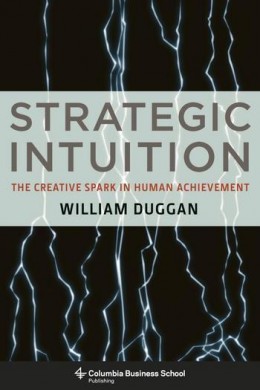
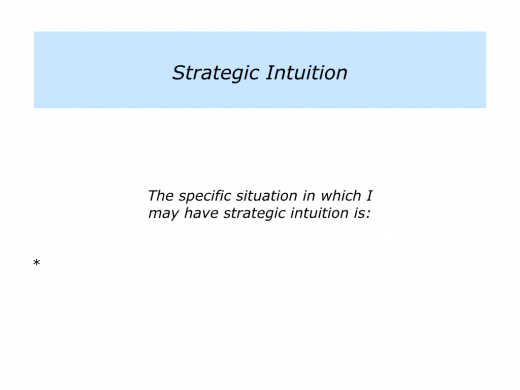
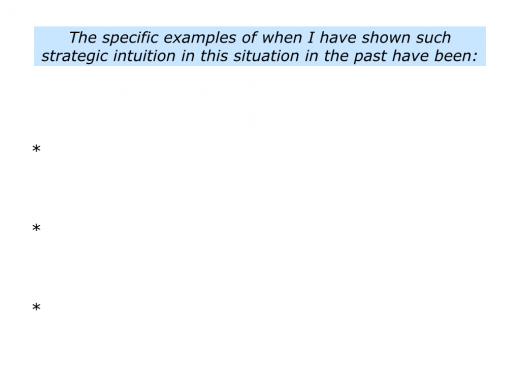
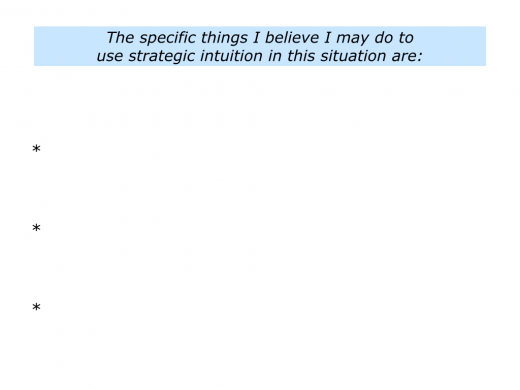
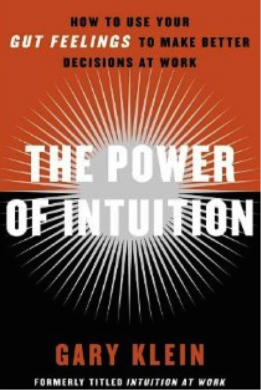
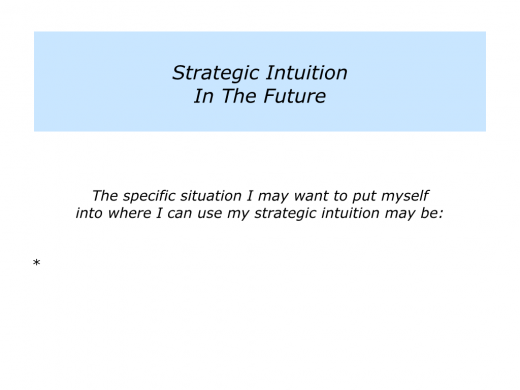
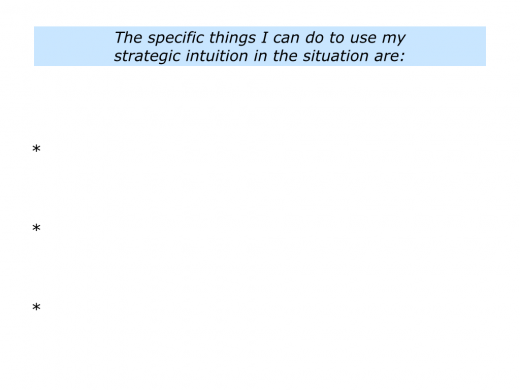
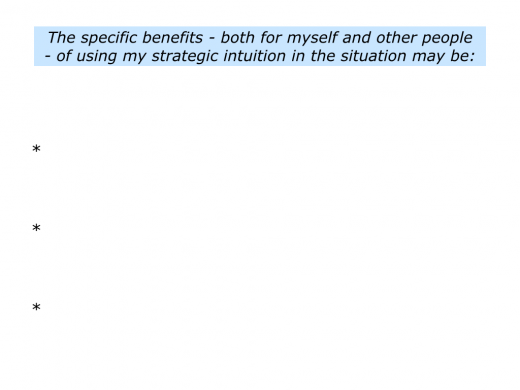




Leave a Reply